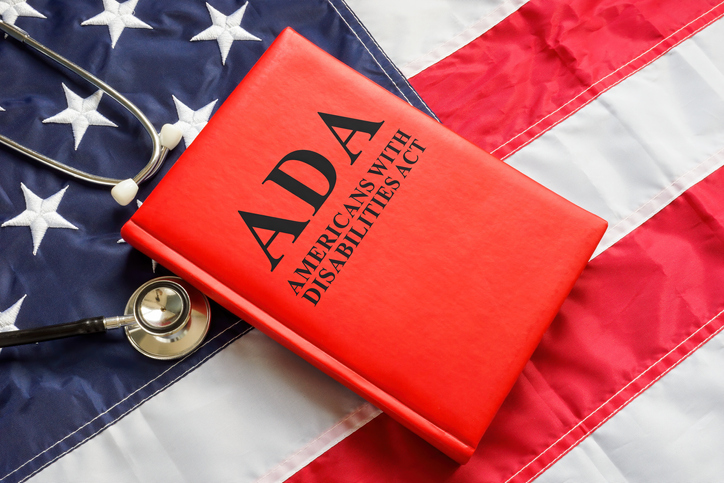Although we’ve seen significant progress towards improving the public’s understanding of substance use disorders in recent years, people in recovery often still struggle with stigma that affects their ability to move forward after seeking residential addiction treatment. At St. Joseph Institute, we urge our clients to keep in mind that addiction is considered a disability under federal law. As such, an estimated one in 10 Americans who are in recovery have legal protection from discrimination.
Understanding the ADA
The Americans with Disabilities Act (ADA) is a federal law implemented on July 26, 1990, to prohibit discrimination against people with disabilities. The ADA is considered a significant piece of civil rights legislation because it is aimed at addressing the unique challenges faced by people with disabilities.
Some of the key provisions and protections under the ADA include:
- Nondiscrimination in employment. The ADA prohibits employers from discriminating against qualified individuals with disabilities in all aspects of employment, including hiring, promotion, compensation, and other job-related activities.
- Accessibility in public accommodations. The ADA requires businesses and facilities that are open to the public to be accessible to people with disabilities. This includes ensuring physical accessibility and providing auxiliary aids and services, like sign language interpreters, to make services and goods available to people with disabilities.
- Equal access to state and local government services. State and local governments must provide equal access to programs, services, and activities for individuals with disabilities, and reasonable accommodations must be made to ensure this access.
ADA.gov is the federal website that provides information about the protections the law offers for people with disabilities.
How the ADA Protects People With Substance Use Disorders
Extensive medical research has established that addiction to drugs or alcohol is not caused by a character defect or lack of willpower. Substance use disorders are complex chronic illnesses with both biological and environmental risk factors. Since they can also substantially limit a person’s major life activities, they meet the definition of a disability as established by the ADA.
People with substance use disorders are protected by the ADA, with some limitations. While people who are in recovery are protected from discrimination due to their condition, individuals who are currently engaged in illegal drug use are not considered “qualified individuals with disabilities” under the ADA.
Here are some key points regarding how the ADA applies to individuals with SUDs:
- Protection from discrimination. People who are in recovery or have successfully completed a rehabilitation program are protected from discrimination under the ADA. Visit the ADA National Network website for examples of a wide variety of situations where people in recovery are protected by the ADA, including cases related to child custody decisions, housing, and access to necessary health care services.
- Reasonable accommodations. If a person with a substance use disorder is considered disabled under the ADA, they are entitled to reasonable accommodations. Reasonable accommodations related to employment might include modified work schedules or time off to attend treatment programs. You can learn more about reasonable accommodations for people in recovery by visiting the SAFE Project website.
- Employment drug testing. Employers can conduct drug testing as long as it complies with applicable state and federal laws. However, the ADA may require employers to make reasonable accommodations for employees with SUDs who are in recovery. The Workplace Fairness website discusses workplace drug testing in greater detail.
What to Do If You Think Your Rights Have Been Violated
If you believe your rights as a person in recovery have been violated, there are several steps you can take to address the situation.
- Attempt an informal resolution. If you feel comfortable doing so, you may want to discuss the situation with the party or parties involved. You may be able to come to a satisfactory resolution just by openly sharing your concerns.
- Document the incident. If your concerns aren’t being addressed, gather details of the incident, including dates, times, locations, people involved, and what discriminatory behavior occurred. If there were witnesses to the incident, ask them if they are willing to provide statements or testify on your behalf.
- Consult with legal counsel. Depending on the nature and severity of the violation, you may want to consult with an attorney who specializes in disability rights or discrimination cases. They can provide legal guidance on how to protect your rights.
- Contact the appropriate government agency. If the violation involves discrimination in employment or housing, consider filing a complaint with the appropriate agency. This could involve agencies like the Equal Employment Opportunity Commission (EEOC) for workplace discrimination or the U.S. Department of Housing and Urban Development (HUD) for housing-related issues.
Get the Help You Need to Be Successful in Your Recovery
At St. Joseph Institute, we believe recovery is possible for anyone who desires it. If you’re committed to making a lasting change and working towards a life free from the burden of addiction, we’re here to provide the resources you need to succeed. Contact us today to learn more about the services offered at our Pennsylvania residential addiction treatment center.


